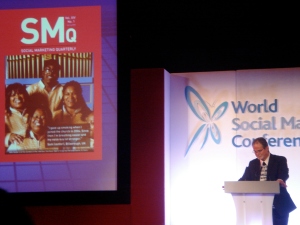 Awestruck, inspred, and amazed, I am reporting live from the World Social Marketing Conference here in Brighton, England. There are so many great and brillant minds present here with over 700+ delegates from across the globe.
Awestruck, inspred, and amazed, I am reporting live from the World Social Marketing Conference here in Brighton, England. There are so many great and brillant minds present here with over 700+ delegates from across the globe.
We have journalists, policy makers, psychologists, gurus, non-profiteers, communication firms, academics, new media techs, international developers, champions for the environment, public health professionals, humanity, researchers, consultants, publishers and many more from across sectors.
Delegates represent South Africa, India, the U.S., England, Portugal, China, Australia, Bangladesh, Slovenia, New Zealand, Senegal in West Africa, Wales, Scotland and many more!
******************
To follow conference updates, Dr. Stephen Dann is commanding the Twittering front @WSMC, and you can following using Twitter Search #WSMC08. Also, presentations and pictures may be gathering on Flickr and Slideshare down the line. I look forward to a posting full of pictures later myself, but here are some great recaps thus far (though, literally, I could post on each one individually!)
Craig Lefebvre: In his keynote, Lefebvre (who I finally got the wonderful opportunity to connect with), brought us social marketers into the danger zone and challenged us, as a global community to form a social marketing global platform. I won’t do Lefebvre’s vision for the field justice in this space, but Lefebvre is laboring tirelessly to rally support for an international professional network, that would be inclusive of those in social marketing, environment issues, public health, business thought leaders, psychologists, economists, marketers, social entreprenuers and more! It could/would involve a case study database, a journal, educational development and shared experiences for all: thus highlighting the variety of roles us social marketers, can, do and should have in the social change sector. Currently, Lefebvre has raised a quarter of a million dollars to support this organization and asks: What will you do?
Philip Kotler: A guru favorite for many conference delegates, Kotler laid out his most recent work on the subject of poverty. Kotler and colleague Nancy Lee, in their next book, apply social marketing to the problem of poverty. Within the presentation, Kotler identified four main methods currently being used to reduce poverty:
- Economic Growth Strategy
- Redistribution Strategy
- Massive Foreign Aide
- Population Control
In this book, Kotler and Lee lay out a 10-step process for demystifying the poverty problem while providing resaons why it is all of ours problem. Looking at the World Bank and The U.N.’s Millenium goals, and the approachng deadline for results, this application is most needed.
Nancy Lee: In a wonderfully graceful way, Lee provided four clear examples on how social marketing utilizing all four of the 4Ps – product, price, place, promotion. Lee concluded that her state, Washington, hopes to become a role-model to gain the attention of those in Washington D.C. and further establish social marketing as a working strategy and field. My favorite part of her presentation was her exclamation that social marketing must become a required course. I highly agree, and ask: What is one way, us in the trenches, can make social marketing a required course? My answer: ask for it. Students, and those interested in social and behavior change: investigate social marketing. Ask about it. Reach out. Demand it.
****************
These are my first three updates, and the computer area is closing, so thus, I must close. More to come in following days!
Liked what you read? Feel free to share with others: 
















